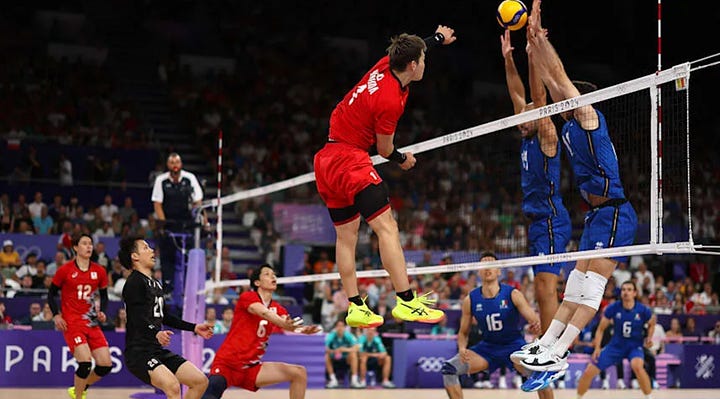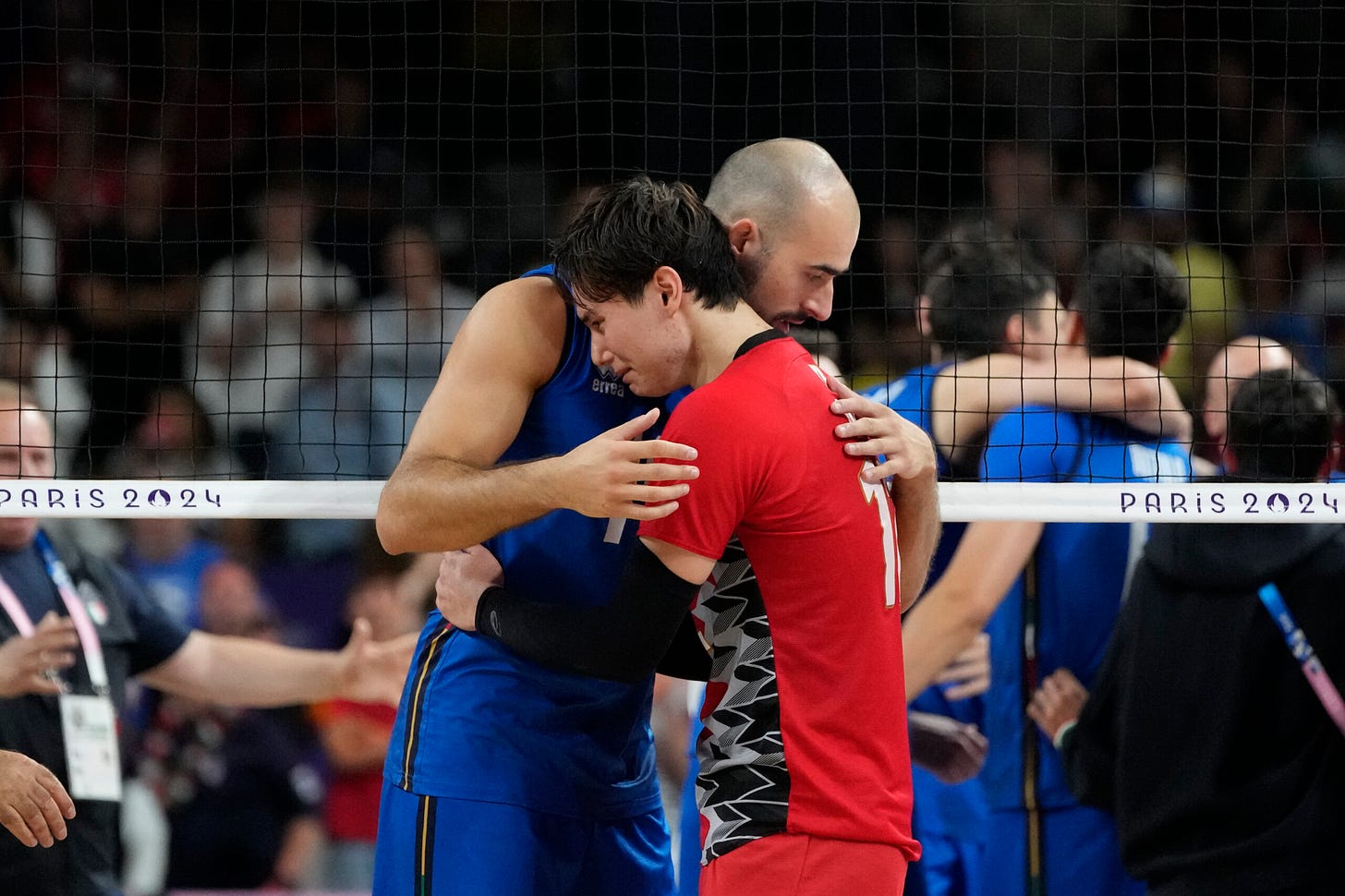Embracing the obvious
On spikes and strikes, high stakes and slow paces, and how it's never too late to learn new things.
2 weeks ago, Roki Sasaki signed with the Dodgers. A year ago, this wouldn’t have meant anything to me. On second thought, it wouldn’t have mattered much less 6 months ago, before Paris 2024.
The Olympics arrived amid a turbulent summer - counter-programming to another acrid season of politics and cynicism. There was an irreverence to Brat, which I loved too, but for me, the spectacular pageantry and the organization of the Games one upped it by a thin margin, and for one simple reason - the timelessness of rallying around one thing: celebrating athlete unknowns and the triumph of ambition.
My first lucid account of the Olympics was when I was 11. Beijing 2008 was the Phelps and Bolt show. Michael Phelps shattered records with eight gold medals, surpassing Mark Spitz. Usain Bolt electrified the track, claiming gold in the 100m, 200m, and 4x100m relay (later revoked) while obliterating world records. London 2012 had its moments—Bolt defended his throne, Phelps extended his legacy—but it felt like an encore, not a revolution. Rio 2016 stumbled under the weight of scandal and economic strain, delivering brilliance in bursts but never quite lifting the haze. Tokyo 2020, postponed and subdued, played to empty stands, and felt more like a muted spectacle more about endurance than euphoria.
I turned 27 in July, a month before the games. I wasn’t mired in deadlines or preoccupied with the next thing—the next assignment, the next exam, the next step toward some nebulous future. I was thinking about things more cogently and had arrived at a point where I could embrace new experiences not out of necessity but curiosity. Instead, the games were something I happened to stumble into and let consume me for 2 weeks. It helped that I wasn’t working at the time, so I was clocking in woman gymnastics and double pike vaults on 11am on a Tuesday. The athleticism was preposterous; the routines were hypnotic; the stakes were high.
I remember sitting down with my dad to watch the opening ceremony, with a feeling in my bones that these games would be memorable from the start: an opening ceremony and competitions on the River Seine; extensive security measures quieting a bustling city; the potential for equal gender representation among athletes for the first time. Through the disruptions and controversies, dreams realised and denied, what were familiar sights to so many became an entry point for me.
Paris was notably the first Olympics in history to achieve numerical gender parity on the field of play, with the same number of female and male athletes participating in the biennial affair. Everyone had a keen understanding of the stakes at hand: the endless well of effort these women had to expend to experience the world, even for a second, with a level of power usually reserved for men. So I celebrated them.
source: Hey Girls
Algerian boxer Imane Khelif came to Paris expecting to fight for a medal—she guaranteed one in the semis, but her biggest battle was against the politics of gender and eligibility. The world watched as she endured intense scrutiny in the ring, online abuse around the world over misconceptions about her womanhood, and ultimately a gold medal. Australian’s Jessica and Noemie Fox turned kayak cross into a family dynasty, collecting three golds between them. Arisa Trew, Australia’s youngest Olympian, skated straight into a history making gold medal. Chiharu Shida’s badminton was all elegance; each rally was a brushstroke. Kim Yeji’s presence on the piste felt impenetrable, a quiet, unshakable force. She was laconic, with a magnetism that ricocheted around the room. Within days, fan cams and fan art flooded timelines, every edit sharpening her cinematic cool. Qinwen Zheng, relentless and radiant, carried Chinese tennis to its first Olympic singles gold. Some countries are built for the podium. Others spend decades waiting. Thanks to Julien Alfred, St. Lucia waited no more.







Female athletes emerged as powerful symbols of progress, resilience and triumph during the biennial event
And on the other team? Ten years of being a Haikyuu fan naturally led me to peruse the men’s volleyball. I understood the game in theory—the momentum shifts, the calculated risks, but watching the global parity of the big leagues widened the aperture. In a display of physical and tactical fortitude, Japan lost 3 sets to Italy despite standing on the precipice of history with a 2-set lead - they were on the brink of their first Olympic semifinal in 36 years. It was a reverse sweep and a subversion of expectations so ruthless it embalmed itself into my soul. I watched the match in one sitting and remarked at how Yuki Ishikawa left everything on that court. 32 points with 30 kills and two aces. He was the first male volleyball player to score over 30 points in Paris. It felt like I had been orbiting this team for years without realising it.



I entered a state of feverish clarity.
The loss made my world bigger. Now I watch the SuperLega - Italy’s top professional volleyball league. Simone Giannelli, the Italian setter who spearheaded the comeback with ice in his veins, captains Perugia. Yuki is his teammate. The same man who crushed Yuki’s Olympic dreams is now someone I root for on club nights. I learnt that is the fate of athletes -they become nodal points for the absurd. For some, the triumph of loving sports is revelling in the power it confers you - the ability to shift allegiances, to move with the game, to recognise that today’s rival is tomorrow’s teammate. But with loss, you watch how they bite the bullet and move on, and you feel inspired to do the same. The beauty of sports isn’t just in loyalty; it’s in embracing the global showcase of styles, the relentless evolution of competition. Perugia’s roster alone is a testament to that— Agustín Loser of Argentina, Kamil Semeniuk of Poland, players who all stood on the Olympic stage, now woven together under one club banner. The heartbreak of one tournament folds into the rhythm of another.
The Olympics cracked something open for me. Not just in volleyball, but in the way I watched sports altogether. I started seeing them less as isolated spectacles and more as intricate, living systems—patterns of play, momentum shifts, strategies unfolding in real time. It wasn’t just about the emotions; it was about how those emotions were built, play by play, number by number. And if there’s one sport where numbers shape everything, it’s baseball.
Baseball has always been there. My dad is a Dodgers head, so blue propaganda has been running in the background for as long as I can remember. But now more than ever feels like the perfect time to tune in. Shohei Ohtani looms larger than the whole sky. Roki Sasaki used to be the world’s most coveted free agent, and is now in the mix. New legends are being minted by the second. And that’s the thing - the business of baseball amplifies its emotional resonance. The long contracts, high stakes, and investments in players turn every game into more than just a contest—it becomes a story of risk and reward.
Baseball thrives on its narrative arc—the slow build-up to a climactic payoff. When Roki Sasaki signed with the Dodgers, it wasn’t just about talent. It was a calculated move in a billion-dollar industry where decisions are made as much in boardrooms as they are on the field. Baseball, I’ve come to realise, is a business—a performance that sells narratives as much as it does tickets.

Baseball’s slow, deliberate pace mirrors its intricate financial ecosystem—teams negotiating trades, the influence of sponsorships, and the commercialisation of even the smallest details, like jersey patches or stadium naming rights. Baseball isn’t just a game; it’s a carefully orchestrated theatre of commerce. It feeds into the same part of me that fixates on patterns, that lingers on the minutiae of a system until it makes sense. It’s meticulous. It rewards patience and scrutiny.
It’s also a sport obsessed with numbers. Every home run is a return on investment, every strikeout a calculated risk in a sport where spreadsheets matter as much as scoreboards. Batting averages, ERAs, and WAR stats dominate conversations. But those numbers aren’t just for the fans—they’re the currency of baseball’s business, dictating player salaries, endorsements, and even franchise worth. Success in baseball isn’t just about winning games; it’s about parlaying raw talent into marketability, turning statistical excellence into multi-million-dollar deals. And yet, somehow the magic of the game transcends the business behind it.
The 2024 World Series was the perfect storm. Dodgers vs. Yankees, baseball’s oldest script, reimagined with the most dramatic flourish: a five-run deficit, erased in real-time. Game 5 was over before anyone could catch their breath, the Dodgers clinching the title 7-6. A reverse sweep in spirit, if not in sets—one moment, the Yankees had it in the bag, and then they didn’t. It was the kind of loss that lingers in your bones, and the kind of win that turns passive observation into passion. It epitomised this tweet:
You feel frustration, but there’s an outlet for it. You experience envy, but it transforms into admiration or motivation. You hate, but in a way that’s playful, ritualistic, even communal. You foster the part of you that loves to antagonise and thrives on rivalry, but suddenly, you have an outlet for all this energy: a certain verve and fury, the kind of feistiness that feels like a sucker punch.
Last year, I watched how all sectors of society came together to achieve a nation’s Olympic dream—proof that unity, while often elusive, is possible. And yet, this isn’t just a rarefied observation on modern society; it felt incorporeal, something larger than the sum of its parts. The Olympics were more than just a showcase of athletic excellence—it was a rare, unifying force in an increasingly fragmented sports landscape. And for someone who had been ambivalent to baseball, these shifts—the seismic drama of the World Series, the Dodgers stacking their roster, the sheer gravity of Ohtani—turned passive exposure into something else entirely. The narratives, the numbers, the shared stakes—it all clicked.
Maybe that’s why I’ve latched onto these movements with such urgency. Because beyond the spectacle and the numbers, they offer a kind of emotional scaffolding. A way to process anticipation, disappointment, exhilaration—all at once, in real time. For me, watching sports is a low-stakes way to practice weathering the highs and lows, to sit with frustration without letting it consume you, to feel loss and still move forward. It's a framework for understanding pressure, for witnessing resilience in its purest form.
At 27, I’m happy to have found a new outlet that take all that restless energy—the frustration, the envy, the need to dissect and deconstruct—and alchemise it into something communal and electric. The stakes may not be personal, but the emotions are real. It’s a space where all that intensity has somewhere to go, where the highs are euphoric and the lows are devastating but never permanent. Where won and cherished animosities fall away for a few hours as you come to celebrate a rite of endurance and vicarious suffering. But no matter the outcome, you wake up the next day and do it all over again. Maybe that’s why I keep coming back. Because hate, when it’s funnelled through the right channels, isn’t destructive. It’s fuel.









